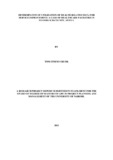| dc.description.abstract | Health care professionals spend a significant proportion of their working time collecting large amounts of client and patient data that is rarely analyzed and used at the point of collection. Health workers merely collect aggregate and dutifully pass over this data to the next level. This information is rarely ever used to guide local action at the level at which data is collected. The purpose of this study, therefore, was to establish determinants of utilization of health related data for service improvement in healthcare facilities within Nyando Sub-County. The objectives of this study were as follows: to investigate how demographic characteristics of staff influence utilization of health related data, to establish the level at which staff involvement influence utilization of health related data, to assess the extent at which staff attitude influence utilization of health related data and finally to examine how leadership goodwill influence utilization of health related data. This study was anchored on the Theory of Planned Behaviour advanced by Ajzen (1991). A descriptive survey research design was adopted to guide the study. The target population of the study was 650 HCWs offering healthcare services in health facilities within Nyando Sub-County. Using Kathuri and Palls (1993), sample determination formula, the sample was determined as 241 HCWs. This study used stratified random sampling to identify the respondents. Self-administered questionnaire was used as the primary research instruments in this study. Quantitative data obtained from close ended questions which were analyzed using descriptive statistics using SPSS and presented in such as frequencies and percentage, charts and tables. The questionnaire return rate was 99% (239) of the targeted respondents. There was a significant relationship between IT knowledge and the level of data utilization for decision making, χ2 (2 N=237) = 14.617, p=0.001.There was no significant association between staff involvement in data discussions and their levels of utilization of health related data χ2 (2,234) = 3.108, p = 0.211. The attitude of staff on trainings received on data management had a significant relationship with the level of utilization of health related data, χ2 (8) = 23.85, p= 0.002.The association between the support of the leader on data utilization and the level of data utilization was significant, χ2 (6,237) = 47.997, p<0.000.The study concluded that demographic characteristics of staff, staff attitude and leadership goodwill influence utilization of health related data. Staff involvement in data related discussions did not have significant influence on utilization of health related data. It is recommended that the IT knowledge of all HCWs be; there is need to have staff engage more in tailor made trainings and workshops on data collection, collation, processing and utilization; and, leadership support to staff should be enhanced in relation to collecting, collating, processing and utilizing the data in decision making. | en_US |

